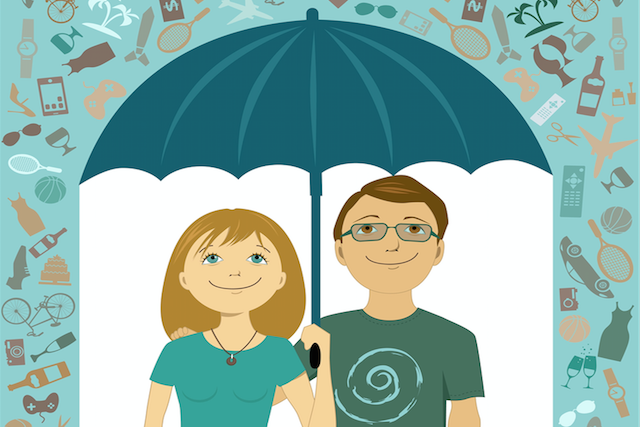
UPDATE – The winners for this giveaway are:
- CA Los
- Joy Nicholson
When I think of minimalism, I think of two things: freedom and Joshua Becker’s blog, Becoming Minimalist.
I think of freedom because downsizing has enabled me to afford more experiences with people I love, travel more often, and do it all without the burden of storing and maintaining possessions I don’t really need.
I think of Joshua Becker’s blog because I’ve turned to it many times over the years for insights and tips to help me simplify and declutter.
For this reason, I was thrilled when Joshua reached out to me to share his latest book, The More Of Less: Finding the Life You Want Under Everything You Own.
Currently a bestseller on Amazon, The More of Less explores how our stuff can hold us back from pursuing our dreams, and how getting rid of things we only think we want creates space for what we actually need.
With personal stories and practical advice, The More of Less is the perfect guidebook to help anyone escape the trap and stress of consumerism.
I’m grateful that Joshua took the time to answer some questions about his work and his book, and that he’s offered two free copies for Tiny Buddha readers.
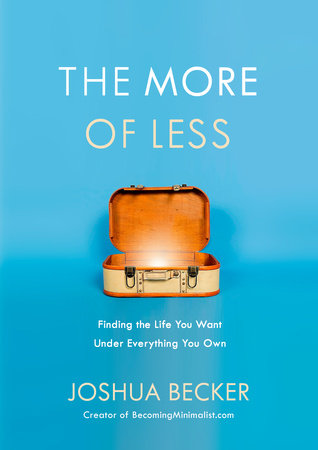 THE GIVEAWAY
THE GIVEAWAY
To enter to win one of two free copies of The More of Less:
- Leave a comment below
- For an extra entry, share this interview on Twitter or Facebook, and post a second comment with the link
You can enter until midnight PST on Wednesday, May 18th.
THE INTERVIEW
1. Tell us a little about yourself and what inspired you to write this book.
Eight years ago, after spending an entire Saturday cleaning my garage while my son played alone in the backyard, I made a life-changing realization: Everything I owned wasn’t making me happy.
Even worse, everything I owned was actually distracting me from the very things that did bring me joy. So my wife and I began a journey to remove the nonessential possessions from our home and life.
We discovered the first step to crafting the life you want is to get rid of everything you don’t. That is the message of the book.
2. Many people equate minimalism with deprivation—possessing the bare minimum and forgoing all luxuries. What does minimalism mean to you?
Minimalism is not about deprivation; it’s about liberation. It’s less about the things you remove and more about the things you add.
In the book, I define it this way, “Minimalism is the intentional promotion of the things we most value and the removal of anything that distracts us from it.”
With that definition and understanding, minimalism becomes entirely freeing. Everybody is going to pursue it differently because everybody defines their values differently.
3. What do you think are the top benefits of a minimalist lifestyle?
There are countless benefits to owning less: more time, more money, more freedom, more energy, less stress, less worry, less distraction.
We become better examples for our kids and better stewards of our environment.
We quickly discover contentment, gratitude, and margin for generosity.
Minimalism frees us to better pursue our greatest passions.
4. Why do you think so many of us get ourselves into debt buying things we don’t need when it ultimately causes so much stress?
There are reasons both internal and external. But no conversation on the causes of rampant consumerism in our society is complete without considering the effect that media and advertisements have on us.
According to statistics, we see 5,000 ads every day. And every single advertisement carries the same message, “You’ll be happier if you buy whatever we’re selling.” And I think, because we see this message so many times and from so many places, we begin to believe it without even realizing we do.
5. Is there anything that can help us resist the urge to over-consume in that moment when we might look to a physical thing to fill a psychological need?
I think there are a number of ways to overcome consumerism in our lives. As we begin to purposefully own less and recognize the benefits of it, we become more aware of consumerism’s empty promises—that more doesn’t equal better—and we are more equipped to overcome those temptations.
Others have found great success in establishing a two-day or three-day wait period before making purchases. That time away from the emotion of the purchase allows them to think deeper about the purchase.
6. As someone who tries to keep clutter down, I’ve struggled when it comes to items with sentimental value, like childhood journals and photo albums. How do you recommend dealing with items like these when downsizing?
There are definitely some tips and tricks for each of these items. It usually comes down to one important realization: “Less is different than none. And less is better than more.”
For example, sentimental items. I wouldn’t encourage anyone to remove every piece of sentimentality from their lives. But people would benefit from sorting through their sentimental pieces and keeping only the most meaningful.
Oftentimes, those who are the most sentimental have accumulated so many things over the years, the pieces are merely stored in boxes in the attic—bringing value to no one.
Working through those items, perhaps trying to cut their collection in half, brings more value to the memories because the most important pieces are not buried underneath piles of unnecessary things.
7. Many of us reserve de-cluttering for specific times of year—during Spring Cleaning, for example—but then clutter builds back up again. What are the top habits we can adopt to maintain a clutter-free (or less cluttered) environment?
That is great insight Lori! For most families, stuff enters the home every single day (especially when kids are present). When we only declutter around certain times of the year, things begin to pile on top of each other—usually leading to frustration and a breaking point.
It’s helpful to remember if you live in a home where things consistently enter, that you’ll need to consistently be removing things.
Walk around your home and begin to notice the various “clutter hot spots” where things start to pile up first (kitchen counters, desks, bedroom dressers). Work hard to keep those areas clutter-free and they will set an environment for the entire home.
8. Do you have any advice for someone who’d like to reap the benefits of minimalism, but shares space with a partner or others who aren’t on board?
It’s always easy to see everyone else’s clutter than it is to see our own. It’s important to start with that realization.
Additionally, I’ve become convinced over the years that the best thing we can do is lead by example, offer patience, and engage in constructive conversation (not conversations born from frustration or impatience).
Focus on the benefits and the positive changes that could come from it. Remember, the simplifying conversation is really not one conversation at all. It’s almost always many conversations.
9. With so many companies marketing varied products to kids, and so many parents buying them, how can we introduce minimalism to children without making them feel deprived or left out?
Your young children have probably never heard of minimalism, much less thought about it in any depth. So begin by describing minimalism in simple terms.
Explain why you and your spouse are choosing to embrace a lifestyle of less, as well as the benefits you are hoping your family will receive from it.
Kids are often much smarter than we give them credit for. Yours will soon realize that you’re not punishing them; you’re doing this because you love them.
10. What’s the main message you hope readers take away from your book?
I want people to realize that their lives are too valuable to waste chasing and accumulating material possessions.
I want people to know they were designed to accomplish more significant things than filling a big house with a lot of stuff.
And I want them to realize that all the stuff they own is actually keeping them from fulfilling their biggest dreams.
FTC Disclosure: I receive complimentary books for reviews and interviews on tinybuddha.com, but I am not compensated for writing or obligated to write anything specific. I am an Amazon affiliate, meaning I earn a percentage of all books purchased through the links I provide on this site.
You can learn more about The More of Less or grab a copy on Amazon here.
About Lori Deschene
Lori Deschene is the founder of Tiny Buddha. She started the site after struggling with depression, bulimia, and toxic shame so she could recycle her former pain into something useful and inspire others do the same. She recently created the Breaking Barriers to Self-Care eCourse to help people honor their needs—so they can feel their best, be their best, and live their best possible life. If you’re ready to start thriving instead of merely surviving, you can learn more and get instant access here.
- Web |
- More Posts


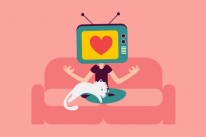




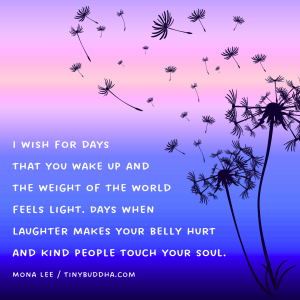
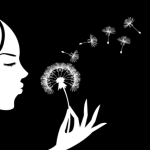




 Though I run this site, it is not mine. It's ours. It's not about me. It's about us. Your stories and your wisdom are just as meaningful as mine.
Though I run this site, it is not mine. It's ours. It's not about me. It's about us. Your stories and your wisdom are just as meaningful as mine.